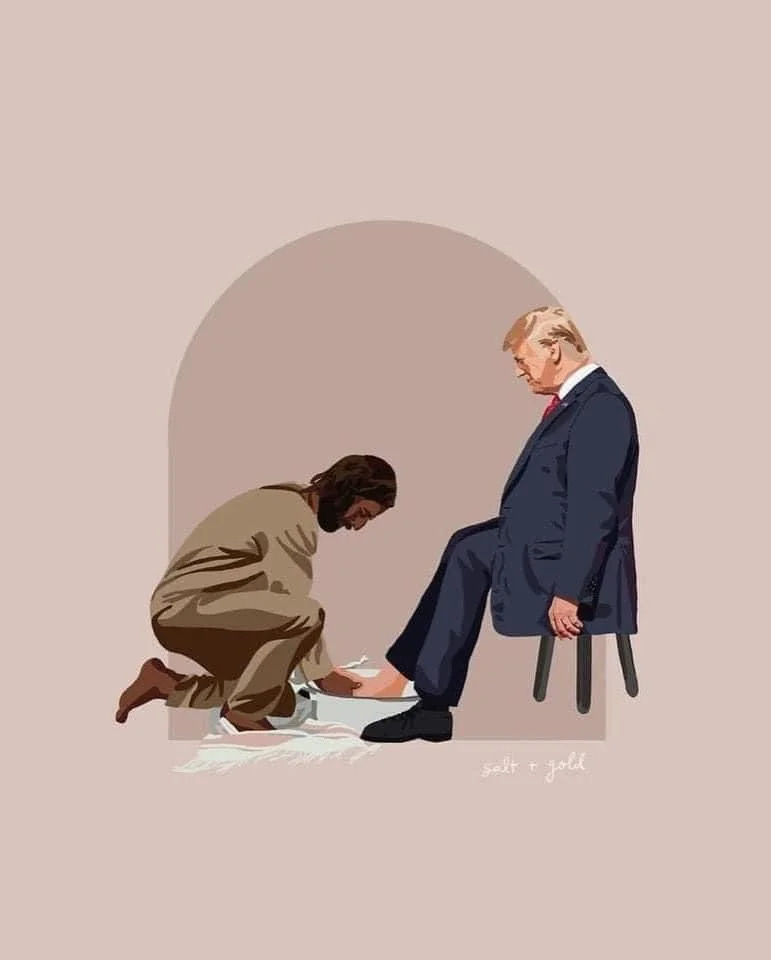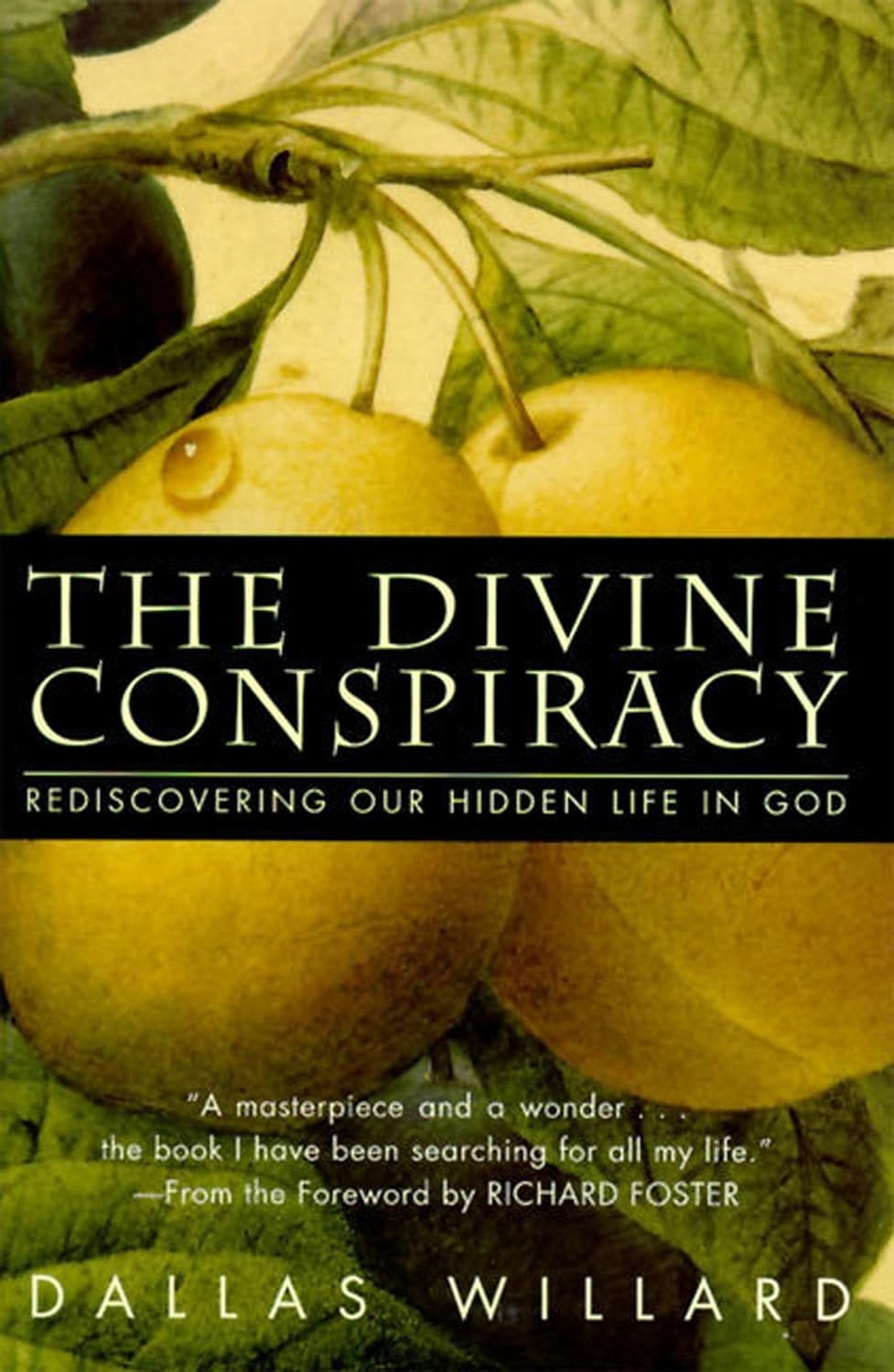A Fool's Play
An April Fool's Reflection on God, Donald Trump, and a Divine Conspiracy
I have been bothered by this image of Jesus washing the feet of President Donald Trump since I first came across it a few months ago. I have had some ideas about it that I wanted to articulate but didn’t know when might be a good time. But here we are on April Fool’s Day and I figured, what the hell? Maybe today we can give ourselves permission to lighten up and wonder about the wildest trickster there is: God.
If you are like me, the image of Jesus washing Trump’s feet stirred something in you. Triggered something in you. Maybe it’s absurd enough to amuse you. Maybe it’s bold enough to bother you. I get it. Pairing Jesus with that man feels like a curveball. Like it or not, it forces a question: What happens when God’s grace shows up where we least expect it? What if Donald Trump leading America at this moment in history is part of a divine conspiracy?
Dallas Willard was the first I ever heard use the term “divine conspiracy.” In his book bearing that title, Willard unpacks Jesus’ teachings as a radical invitation to live in God’s kingdom right now, not just wait for it later. He calls it a “divine conspiracy”—God’s sneaky, world-flipping plan to make His reign available to everyone, from the broken to the boastful. The Beatitudes, Willard says, aren’t a VIP list for the pious; they’re Jesus shouting good news to the least likely, showing that the kingdom belongs to the poor in spirit as much as it challenges the proud. For the sake of this April Fools’ reflection, Willard’s lens sharpens the picture: God’s grace isn’t picky. It’s a conspiracy of love that chased tyrants like Nebuchadnezzar and still hunts hearts today, no matter how high or low they sit. His take on discipleship as apprenticeship to Jesus helps us see why God plays these tricks—not to shame, but to transform.
In a previous blog, I used the story of Nebuchanezzar’s golden statue and the resistance of Shadrach, Meshach, and Abednego as an example of how we can remain faithful in the shadow of growing authoritarianism and imperialism. But there is another side to the story as found in the Book of Daniel. On the one hand, we have the tales of godly heroes who refuse to bow to the wicked king and are rescued time and time again by God. The other story is the story of Nebuchadnezzar, the wicked king himself with the golden statue and the swagger to match. He’s the villain we love to boo: conqueror, idol-maker, the guy who’d fit right in with today’s power players. Yet God doesn’t just topple him. He toys with him.
He sends a dream of a statue smashed by a stone (Daniel 2), a riddle that shakes his confidence. Nebuchadnezzar shrugs and builds his idol anyway. Three Jews defy him, walk out of a furnace alive, and he’s left stammering, “No other god can save like this” (Daniel 3:29). Still, he clings to his throne.
Then God pulls the rug out. Another dream comes: a tree felled, a king turned beast. “That’s you,” Daniel warns. “You’ll eat grass till you see who’s really king” (Daniel 4). A year later, mid-brag, it happens. Nebuchadnezzar’s on all fours, a royal punchline for seven years. He stays there until he lifts his eyes and prays: “I praised the Most High… His dominion is eternal” (Daniel 4:34). The trick lands, not to crush him, but to catch him. A heart is won through humiliation and grace. A beast becomes human again.
That’s the foolishness I can’t shake. We cheer when grace lifts the poor: the widow, the orphan, the immigrant. We should. Jesus said the kingdom belongs to them (Matthew 5:3). But what about the Nebuchadnezzars? The ones with private jets and X accounts that never shut up? Do we gag at the thought of God chasing them too? I do, sometimes. It’s easier to love the underdog than the overlord. Yet there’s God, pulling stunts, flipping scripts, refusing to play by our rules.
Willard’s voice echoes here. He argued that Jesus’ Beatitudes (blessed are the poor, the meek, the mourners) weren’t a list of winners and losers. They were an invitation. The kingdom isn’t just for the “good” people. It’s for anyone willing to step into God’s reality, where power and pride get turned on their heads. Nebuchadnezzar didn’t deserve the chase. He enslaved nations and burned dissenters. But God chased anyway. Why? Because grace doesn’t wait for worthiness. It’s a divine conspiracy. It’s a plot to redeem the whole messy lot of us, from the gutter to the penthouse.
This gets me tangled up. I love the idea of grace for the least of these. The single mom juggling three jobs, the bullied kid with holes in his shoes: they’re the ones I want to see lifted. Jesus spent His days with them, after all. But the powerful? The ones rigging systems, hoarding wealth, shouting over the rest of us? I’d rather they get a timeout in the grass than a seat at the table. Yet God’s not checking my scorecard. He’s kneeling, washing, inviting. And that’s where Willard’s wisdom stings: the kingdom of the heavens is available to them too. It’s not because they’ve earned it, but because God’s up to something bigger than my feelings.
Or what about Jonah? God sends him to Nineveh (killers, oppressors, the worst), and Jonah pouts when they repent (Jonah 4). Or Jesus, breaking bread with tax collectors who were wealthy off of the backs of Israels’ poorest, while the pious squawked (Luke 5:30). This is the foolishness of God. It’s wiser than our wisdom, stronger than our strength. It’s not fair. It’s not supposed to be. It’s grace, crashing in like a prank we didn’t see coming. That image above? It’s not a gotcha. It’s a mirror. If God can chase a Nebuchadnezzar, what’s stopping Him from chasing the loudest voices today? Or you? Or me?
I would rather do without this tension. Loving the poor feels holy: feed the hungry, clothe the naked, live out Matthew 25. I’m all for it. But grace for the powerful? That’s a stretch. I’d rather they sweat a little longer. Yet the Spirit whispers: the kingdom’s here, now, for anyone who’ll take it. Jesus didn’t wait for the tax collectors to quit extorting or the disciples to stop doubting, or the conspirators to stop conspiring. He washed their feet anyway, Judas included. He’d wash the single mom’s and the CEO’s, no hesitation. Because grace isn’t about who we think deserves it. It’s about who God is.
So, that image. If it’s a prank, it’s God’s, not mine. April Fools’ Day is the perfect stage: laugh at the oddity, then wrestle with the truth. Nebuchadnezzar ate grass and found grace. The poor get blessed, the powerful get humbled, and we’re all caught in the same divine plot. Willard called it a conspiracy of love. It’s God sneaking into our world, upending our rules, chasing hearts we’d write off. I don’t always like it. I don’t have to. But I can’t unsee it: the One with the basin, stooping low, making fools of us all until we join the laughter.
Happy April Fools’, friends. The kingdom’s closer than we think. It’s wilder than we’d dare dream.




Boy did this hit hard!!! Yikes that hurt!!!